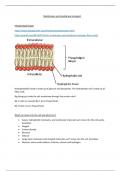Class notes
Biology ib membranes notes
- Course
- Institution
- Book
This document provides detailed information about membranes with ib biology syllabus includes. There are notes from the textbook, powerpoints and past papers. I recommend looking over this document for review and memorizing the facts for a test.
[Show more]




